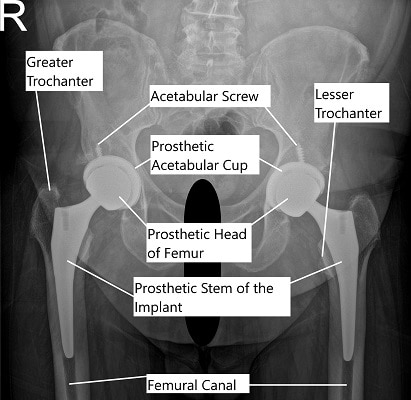Total hip replacement has revolutionized the treatment of hip pain resulting from arthritis. The hip pain may severely affect daily activities such as walking, bending, sitting, navigating stairs, or driving a car. The symptom which is often not discussed with the surgeon is decreased sexual intimacy due to pain.
The patients undergoing a total hip replacement have a dramatic recovery from pain. The patients are able to quickly get back to the daily activities they enjoy. However, some patients may often be reluctant to have sexual intimacy due to a fear of pain or dislocation.
Sex after total hip replacement is a topic often not discussed by patients and physicians alike. Healthy sex life is imperative for the patient’s health and an important aspect of quality of wellbeing. Lack of intimacy after total hip replacement may lead to unhappiness and may result in tension in a patient’s daily life.

X-ray showing bilateral Total Hip Replacement
With an improvement in movement and relief from pain after total hip replacement, sexual intimacy is safe to resume in most patients. The risk of dislocation or impingement depends upon the posture during sexual intimacy.
The majority of patients are able to walk unaided and with full movements after total hip arthroplasty in 6 – 12 weeks. The patients are generally advised to resume sexual intimacy after this period. Without proper information, many patients over-evaluate the risk of dislocation and avoid hip relaxation. The use of prescription pain medications during early rehabilitation may make the patient drowsy and hamper sexual intimacy.
The time period to resume sexual intimacy also depends upon the approach of the total hip replacement. The patients with joint replacement done with an anterior approach may be able to resume intimacy earlier than those performed with a posterior approach. The rehabilitation period allows the tissues to heal and the strength of the muscles around the hip is gained gradually.
In an anterior hip replacement, the joint is opened from the front of the hip. Without adequate precautions, the chances of dislocating the joint are more in the front. The patients undergoing anterior hip replacement are generally able to resume sexual activity sooner and with fewer precautions compared to posterior hip replacement.
The posterior hip replacement is done by opening the joint from behind. Without precautions, there are chances of dislocation from behind. Activities such as bending the hip more than 90 degrees and bringing the knees together put the artificial joint at risk for dislocation. In the case of anterior hip replacement, extending the hip and rotating it outward brings it at risk of dislocation from the front.
The patients are advised to resume with some restrictions depending upon the approach of the procedure. The patients are advised not to lift their partner and bend or rotate the hip beyond what has been advised to the patient. The patients are also advised to use pillows and supports during sexual intimacy. They may also be advised to take an over the counter pain medication half an hour before intimacy to allay pain.
Total hip replacement is one of the most common surgeries performed by orthopedic surgeons. However, the artificial joint is never as stable as the natural joint even after the tissues have healed. Therefore discussing sexual intimacy with the surgeon is important to allay the fear and prevent dislocation.

Dr. Suhirad Khokhar
My name is Dr. Suhirad Khokhar, and am an orthopaedic surgeon. I completed my MBBS (Bachelor of Medicine & Bachelor of Surgery) at Govt. Medical College, Patiala, India.
I specialize in musculoskeletal disorders and their management, and have personally approved of and written this content.
My profile page has all of my educational information, work experience, and all the pages on this site that I've contributed to.
